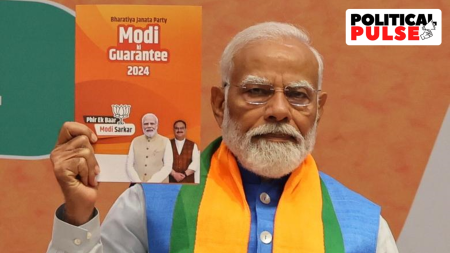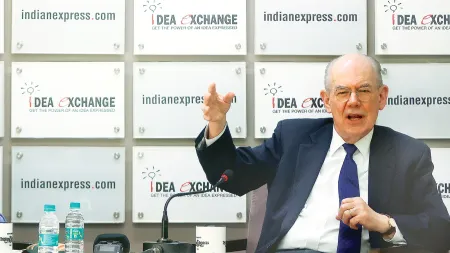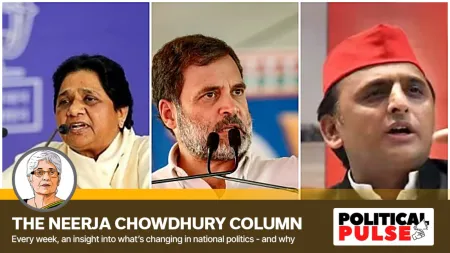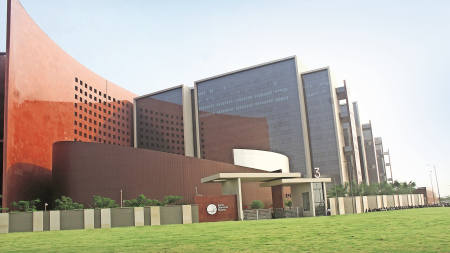- India
- International
Explained: The politics of creating community-based corporations in Karnataka
All parties have created boards and corporations for sub-sects in castes and religious groups with political objectives.
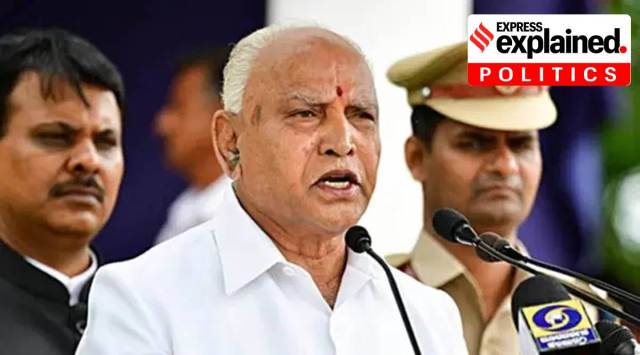 The move to create a corporation for the development of the Lingayat community has been assailed by the opposition Congress as a political tactic by Yediyurappa to consolidate the votes of the community, who make up 17% of the population of Karnataka and are known to be ardent supporters of Yediyurappa and the BJP. (File Photo)
The move to create a corporation for the development of the Lingayat community has been assailed by the opposition Congress as a political tactic by Yediyurappa to consolidate the votes of the community, who make up 17% of the population of Karnataka and are known to be ardent supporters of Yediyurappa and the BJP. (File Photo)The BJP government in Karnataka has in recent weeks announced the creation of three new boards and corporations to oversee the development of certain castes and linguistic groups — including a corporation for the development of the Lingayat-Veerashaiva community (a dominant caste to which Chief Minister B S Yediyurappa himself belongs).
The move to create a corporation for the development of the Lingayat community has been assailed by the opposition Congress as a political tactic by Yediyurappa to consolidate the votes of the community, who make up 17% of the population of Karnataka and are known to be ardent supporters of Yediyurappa and the BJP. An effort to seek inclusion of Lingayats in the OBC category for reservations in central government jobs is also being widely seen as part of Yediyurappa’s attempt to increase his hold on his community.
What is the point of creating community-based development corporations?
The creation of corporations and boards that oversee the development of caste and religious groups are a part of strategies to win the political support of the members of these groups. The support of the Lingayat community, who predominantly live in northern Karnataka, is key to winning nearly 90 of Karnataka’s 224 Assembly seats.
The Lingayat Veerashaiva Development Corporation, being set up with Rs 500 crore funding, will aim to provide scholarships, loans etc. The immediate trigger for its creation is the forthcoming by-elections to two Assembly seats (Basavakalyan and Maski)) and one in Lok Sabha (Belagavi) in the Lingayat belt in North Karnataka. The move came on the back of Yediyurappa announcing the creation of a Maratha Development Board — ostensibly to woo Marathi-speaking voters who are a key segment of voters in Belagavi and Basavakalyan regions.
While the BJP has made an effort to unify all castes under the Hindutva umbrella, the strategy has not been successful beyond the coastal Karnataka region — where the Hindutva factor and religious polarisation has been a key influencer of polls since the 1990s, in the aftermath of the Babri Masjid demolition. The BJP is yet to win a clear majority in Karnataka on its own and has had to rely on defections of MLAs from other parties to establish its majorities in 2008 and 2019.

Does the creation of such boards and corporations help parties win elections?
Ahead of a recent bypoll in Sira Assembly constituency in southern Karnataka – a territory the BJP had never won – the BJP government announced the creation of a development board for the Kadu Golla Scheduled Caste community with a fund outlay of Rs 10 crore. The micro-level caste strategy helped the BJP win the seat for the first time. While all major parties fielded candidates from the Vokkaliga caste (the dominant community in southern Karnataka who make up nearly 15% of the state population) the BJP has been focusing on key sub-groups of the Scheduled Caste and Scheduled Tribe communities.
Is there a larger political significance to the creation of the Lingayat Veershaiva corporation?
The support of the Lingayat Veerashaiva community is considered the key that decides which party will govern Karnataka. The community has been firmly in the corner of Yediyurappa and the BJP in the last decade. In the 2013 polls, the BJP’s tally fell to 40 seats (from 110 in 2008) after Yediyurappa left the BJP and formed his own Karnataka Janata Party, which won only six seats in the polls but damaged the BJP in as many as 36 seats in the Lingayat belt.
In 2018, when Yediyurappa returned to the BJP, the party won 104 seats. Ahead of the 2018 polls, the Congress made a strong bid to win the Lingayat Veerashaiva vote base by recommending to the Centre that Lingayats be accorded a minority religion status.
The creation of the Lingayat Veerashaiva Development Corporation is seen as an attempt not only to consolidate Yediyurappa’s influence, but also to counter a demand in some quarters for 16% reservation for Lingayats in government jobs and education.
How have other parties used this strategy in the past?
All parties have created boards and corporations for sub-sects in castes and religious groups with political objectives. Although a caste- and community-based socioeconomic survey was carried out during the 2013-2018 regime to identify the weakest sections of society and their numbers, the findings have not been made public as yet and they have not been used for implementing government programmes.
While the D Devaraj Urs Backward Class Development Corporation, the Dr B R Ambedkar Development Corporation and the Minority Development Corporation created decades ago are the main entities for implementing welfare schemes, there are also dozens of boards and corporations created for niche communities, many of which are often deprived of funds after they have been created. JDS leader H D Kumaraswamy announced the creation of the Brahmin Development Board at a cost of Rs 25 crore and the Arya Vaishya Development Board with an outlay of Rs 10 crore when he was the CM of the JDS-Congress coalition government between 2018-19. The former Congress government headed by Siddaramaiah created a Bhovi Development Corporation, a Babu Jagajivan Ram Madiga, the Karnataka Thanda Development Corporation for the tribal Banjaras, and Vishwakarma, Uppara and Nijasharana Ambigara Chowdaiah Development Corporations. 📣 Express Explained is now on Telegram
More Explained
EXPRESS OPINION
Apr 16: Latest News
- 01
- 02
- 03
- 04
- 05




